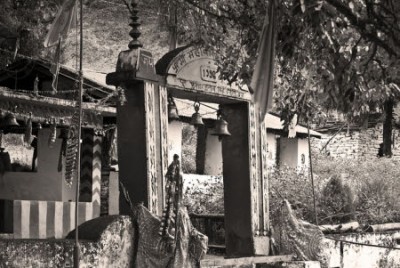by Shobhana Kumar
and one day we arrive—
touristy travellers,
sunglasses, backpacks,
mineral water, et al,
at our ancestral village
to pay homage to
a long-forgotten god.
abandoned, the priest says—
your barren womb is proof enough.
the home that once housed
our great grandmother
stares, aloof, amidst it all.
ma turns a child—
points to this and that,
in a voice that trembles
under the weight of memory—
shadowed imprints of earthen
lamps that once pushed night
out of their house’s days;
half-buried mounds
of earthen stoves
whose aromas somehow
found their way into
our modular kitchens,
some laughter in the courtyard,
fear in a far corner.
and then, she stops
at the room where
she last saw her mother alive;
seven births had finally robbed
grandmother of her eighth child.
at the god’s altar,
ma prays for us.
but my mind wanders
to that moment when He
forsook grandmother.
why would He remember
to guard over us,
three continents away?
Shobhana Kumar’s first volume of poetry, ‘The Voices Never Stop,’ was published by Writers Workshop, Calcutta in 2012. Her work is featured in ‘The Dance of the Peacock—An Anthology of English Poetry from India’ edited by Dr. Vivekanand Jha and will appear in a forthcoming anthology of contemporary women’s writing from India. Her work has also appeared or is forthcoming in several journals in India, USA, Canada and the UK. Origami Poems Project ‘has recently published her first micro-chap book, ‘It’s winter after spring.’ She has authored five books of non-fiction. Her short stories are featured in New Asian Writing and will be part of the 2013 anthology. Her second volume of poetry, ‘*Conditions Apply’ will be published by Writers Workshop in 2014.
Pic : Parth Joshi – https://www.flickr.com/photos/parthjoshi/





